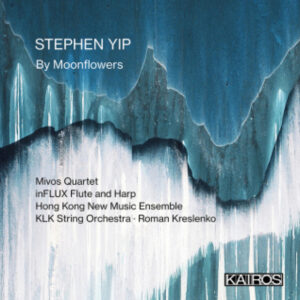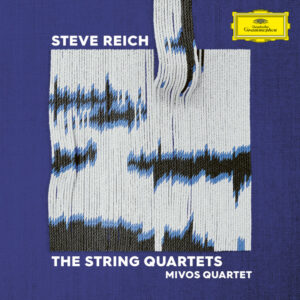Stephen Yip
By Moonflowers
Kairos
Composer Stephen Yip (b. 1971) was born in Hong Kong and now lives in Houston, Texas, teaching at the local community college and fulfilling a number of high-profile commissions. His debut on Kairos is a portrait CD featuring excellent ensembles that play his intricate works skilfully, with a keen sense of their fluid interpretive potentialities.
The Mivos Quartet performs Luminosity Etude (2017), in which rich harmonics and high partials are distressed by glissandos. Mivos also plays the title track (2022), which is inspired by Bashõ’s five original haiku. Although the general atmosphere is subdued, the work is filled with extended techniques. Here again, Yip explores sound spectra. The quartet is also called upon to imitate Chinese musical gestures and scales. The confluence of elements of second modernity and indigenous music display a distinctive vocabulary and compositional voice.
inFLUX flute and harp – Izumi Miyahara and Emily Klein – perform Elegance in Emptiness (2018), a meditative piece with many moments of concord – colorful overlaps of unisons, pentatonic harp passages and arpeggiations accompanying relatively simple melodic lines in the flute. There are also metallic strums, percussive attacks, multiphonics, glissandos, harmonics, key clicks, tremolos, and breathy tones. Unless willing to consider the piece from a reflective stance, the abundance of material could easily overshadow its supple deployment. inFlux performs Elegance in Emptiness with crystalline timbres and well-coordinated rubato.
Renga in Kigo (2019) for viola and cello is played by William Lane and Chak-yin Pun, both members of the Hong Kong New Music Ensemble. Yip’s interest in overtones, tremolos, pizzicatos, et cetera, persists. Although these are lower members of the string cohort, much of their time is spent well above the staff, with only occasional punctuations in the bass register, usually to begin a particular overtone series. Bashõ’s five original haiku is also the inspiration for Renga in Kigo. The four seasons, their various atmospheres and activities, are depicted in a series of interactive duets.
… in a silent way (2014), performed by KLK String Orchestra, conducted by Roman Kreslenko, concludes the recording. In addition to the aforementioned string and spectral effects, the ensemble sometimes plays col legno, adding an element bordering on noise. Yip’s techniques writ large create fascinating, often thornily mixed, textures. As the piece progresses, melodies in octaves make a powerful impression. Harmonics, pizzicato, tremolando, trills, and sliding tone create a buildup that heralds the final section, in which contrapuntal entries juxtapose with swells, glissandos, and glassine upper partials. A long denouement concludes with the concertmaster playing repeated tonic notes and then vanishing.
On By Moonflowers, Yip’s compositions prove to be imaginative, intricate, and eminently engaging. Recommended.
-Christian Carey

